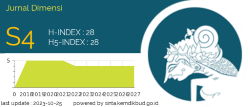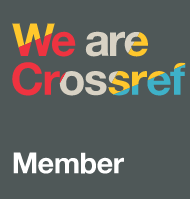A SUCCESSFUL STRATEGY OF POLITICAL PARTY CAMPAIGN AHEAD OF ELECTION IN DEVELOPED COUNTRIES
Abstract
Keywords
Full Text:
PDFReferences
Alfiyani, N. (2018). Media Sosial Sebagai Strategi Komunikasi Politik. Potret Pemikiran, 22(1). https://doi.org/10.30984/pp.v22i1.762
Allen, N. (2015). A Belated Debate. Political Quarterly, 86(1), 141–145. https://doi.org/10.1111/1467-923X.12134
Asmiyanto, T., Ferezagia, D. V., Inamullah, M. H., Abdurrahman, Z., & Roselina, E. (2021). The Effect of Information-Seeking Behavior on Gen-Z Political Preference: Study on 2020 District Heads Election in Depok and South Tangerang. Library Philosophy and Practice, 2021, 1–17.
Bacallao-Pino, L. M. (2015). Communicative inequality in the discursive repertoire of collective action: The case of #YoSoy132. Cuadernos.info, 36, 27–37. https://doi.org/10.7764/cdi.36.742
Campos-Domínguez, E., & García-Orosa, B. (2018). Algorithmic communication and political parties: Automation of production and flow of messages. Profesional de la Informacion, 27(4), 769–777. https://doi.org/10.3145/epi.2018.jul.06
Duenas, J. M. R., & Tejero, M. L. V. (2021). The effect of exposure to pre-election polls in the behavior of voters in the regional elections in Andalusia in 2018. Papers, 106(2), 167–189. https://doi.org/10.5565/rev/papers.2711
Eliya, I., & Zulaeha, I. (2017). Model Komunikasi Politik Ridwan Kamil Di Media Sosial Instagram: Kajian Sosiolinguitik. Dialektika - Jurnal Bahasa, Sastra Dan Pendidikan Bahasa Dan Sastra Indonesia, 4(2), 205–223. https://doi.org/10.15408/dialektika.v4i2.5540
Ellegaard, O., & Wallin, J. A. (2015). The bibliometric analysis of scholarly production: How great is the impact? Scientometrics, 105(3), 1809–1831. https://doi.org/10.1007/s11192-015-1645-z
Evans, M., & Kaynak, M. S. (2015). Media framing in religious–secular conflict in Turkey and Israel. International Political Science Review, 36(2), 139–152. https://doi.org/10.1177/0192512113512147
Fenoll, V., & Cano-Orón, L. (2017). Citizen engagement on spanish political parties’ Facebook pages: Analysis of the 2015 electoral campaign comments. Communication and Society, 30(4), 131–147. https://doi.org/10.15581/003.30.3.131-147
Firmansyah, M. F. (2019). Pengaruh Komunikasi Politic Entertainment Melalui Iklan Terhadap Tingkat Keterpilihan Partai Politik Pada Pemilihan Umum 2019. Jurnal Gama Societa, 3(1), 9–18.
Garrido, M. D. (2020). Open political parties: Applying the principles of open government to spanish political affiliations. Doxa Comunicacion, 2020(31), 63–86. https://doi.org/10.31921/doxacom.n31a3
Hidayati, F. R. (2021). Komunikasi Politik dan Branding Pemimpin Politik Melalui Media Sosial: A Conceptual Paper. Lensa Mutiara Komunikasi, 5, 145–161.
Jatmiko, D. R., Hartiwiningsih, & Handayani, G. A. K. R. (2019). A political communication regulation model in local leaders election and legislative election for realizing a just political education. International Journal of Advanced Science and Technology, 28(20), 349–352. https://www.scopus.com/inward/record.uri?eid=2-s2.0-85080135341&partnerID=40&md5=eb3a8a0d7a214d2473a4a2bb48e5654c
Jensen, M. J. (2017). Social Media and Political Campaigning: Changing Terms of Engagement? International Journal of Press/Politics, 22(1), 23–42. https://doi.org/10.1177/1940161216673196
Kalsnes, B. (2016). The Social Media Paradox Explained: Comparing Political Parties’ Facebook Strategy Versus Practice. Social Media and Society, 2(2). https://doi.org/10.1177/2056305116644616
Kane, J. V. (2020). Fight Clubs: Media Coverage of Party (Dis)unity and Citizens’ Selective Exposure to It. Political Research Quarterly, 73(2), 276–292. https://doi.org/10.1177/1065912919827106
Koc-Michalska, K., Lilleker, D. G., Michalski, T., Gibson, R., & Zajac, J. M. (2021). Facebook affordances and citizen engagement during elections: European political parties and their benefit from online strategies? Journal of Information Technology and Politics, 18(2), 180–193. https://doi.org/10.1080/19331681.2020.1837707
Ktoridou, D., Epaminonda, E., & Charalambous, A. (2018). Social Media in Election Campaigns: The Case of the 2013 Presidential Elections in Cyprus. IEEE Technology and Society Magazine, 37(2), 32–39. https://doi.org/10.1109/MTS.2018.2826063
Lestari, L., & Ratnasari, S. L. (2020). The Influence of Social Media Facebook and Twitter on Student’s Rational Choices. International Journal of Psychosocial Rehabilitation, 24(02), 2142–2153. https://doi.org/10.37200/ijpr/v24i2/pr200515
López-Meri, A., Marcos-García, S., & Alonso-Muñoz, L. (2021). Electoral campaigns and Twitter. The dissemination of media content in the digital environment. Cuadernos.info, 48, 27–47. https://doi.org/10.7764/cdi.48.27679
Loureiro, M., & Ribeiro, J. (2017). Digital democracy and political participation through Facebook: Portuguese legislative elections in 2015. Estudos Em Comunicacao, 24, 229–243. https://doi.org/10.20287/ec.n24.a12
Lubinga, E., & Baloyi, M. (2019). Mining Social Media for Political Communication: Lessons from an Analysis of Twitter Use between Citizens and the African National Congress pre-2014 South African National Elections. Politikon, 46(3), 275–288. https://doi.org/10.1080/02589346.2019.1638128
Maier, M., Bacherle, P., Adam, S., & Leidecker-Sandmann, M. (2019). The interplay between parties and media in putting EU issues on the agenda: A temporal pattern analysis of the 2014 European Parliamentary election campaigns in Austria, Germany and the United Kingdom. Party Politics, 25(2), 167–178. https://doi.org/10.1177/1354068817700532
Mancini, P. (2020). Comparing Media Systems and the Digital Age. International Journal of Communication, 14, 5761–5774. https://www.scopus.com/inward/record.uri?eid=2-s2.0-85099485045&partnerID=40&md5=81ac9ae6bee8abdb6a249af8a5a61d49
Muchtar, K. (2016). Komunikasi Politik dan Pembentukan Citra Partai. Jurnal Ilmu Komunikasi, 14(2), 136–147.
Muthiah, F. (2021). Peran Social Networking Sites dalam meningkatkan Stakeholder Engagement: A Literature Review. Jurnal Lensa Mutiara Komunikasi, 5(2), 86–104. https://doi.org/10.51544/jlmk.v5i2.2161
Nyhuis, D., Song, H., & Boomgaarden, H. (2021). Disproportionality in media representations of campaign negativity. Political Science Research and Methods, 9(3), 519–531. https://doi.org/10.1017/psrm.2020.4
Oehmer, F. (2017). It’s the communication that matters, too! Determinants of interest groups’ media exposure in German newspapers. Interest Groups and Advocacy, 6(2), 179–194. https://doi.org/10.1057/s41309-017-0027-8
Onah, E. I., & Nwali, U. (2018). Monetisation of electoral politics and the challenge of political exclusion in Nigeria. Commonwealth and Comparative Politics, 56(3), 318–339. https://doi.org/10.1080/14662043.2017.1368157
Rahim, S. A. (2019). What can we learn about social media influence in the Malaysian 14th General Election? Journal of Asian Pacific Communication, 29(2), 264–280. https://doi.org/10.1075/japc.00033.rah
Raniolo, F., & Tarditi, V. (2020). Digital revolution and party innovations: An analysis of the Spanish case. Rivista Italiana Di Scienza Politica, 50(2), 235–253. https://doi.org/10.1017/ipo.2019.27
Rodríguez-Castro, M., Campos-Freire, F., & López-Cepeda, A. (2020). Public service media as a political issue How Does the European Parliament Approach PSM and Communication Rights? Journal of Information Policy, 10(1), 439–473. https://doi.org/10.5325/JINFOPOLI.10.1.0439
Rosales, D. F. G., & Vences, N. A. (2019). The use of hypertextuality, multimedia, interactivity and updating on the websites of Spanish political parties. Communication and Society, 32(1), 351–367. https://doi.org/10.15581/003.32.1.351-367
Sachsenröder, W. (2018). Power broking in the shade: Party finances and money politics in Southeast Asia. In Power Broking in the Shade: Party Finances and Money Politics in Southeast Asia. World Scientific Publishing Co. Pte Ltd. https://doi.org/10.1142/10726
Savyasaachi, & Kumar, R. (2017). Social movements: Transformative shifts and turning points In Social Movements: Transformative Shifts and Turning Points (pp. 1–380). Taylor and Francis. https://doi.org/10.4324/9781315662084
Southern, R., & Purdam, K. (2016). The changing representation interface: democracy and direct contact with politicians. Journal of Civil Society, 12(1), 101–120. https://doi.org/10.1080/17448689.2016.1134388
van Nunen, K., Li, J., Reniers, G., & Ponnet, K. (2018). Bibliometric analysis of safety culture research. Safety Science, 108, 248–258. https://doi.org/10.1016/j.ssci.2017.08.011
Wettstein, M., Esser, F., Schulz, A., Wirz, D. S., & Wirth, W. (2018). News Media as Gatekeepers, Critics, and Initiators of Populist Communication: How Journalists in Ten Countries Deal with the Populist Challenge. International Journal of Press/Politics, 23(4), 476–495. https://doi.org/10.1177/1940161218785979
Wiyono, Purnomo, E. P., & Lestari, L. (2023). Culture of Corruption in the Smart Service System of Global Governance. Chinese Public Administration Review, 1 –11. https://doi.org/10.1177/15396754231185320
Wiyono, W., Qodir, Z., & Lestari, L. (2023). Online Media Trends on Political Party Sentiment Ahead of the 2024 Election in Indonesia. Journal of Governance, 8(1), 76–100. https://doi.org/10.31506/jog.v8i1.17880
DOI: https://doi.org/10.33373/dms.v12i2.5495
Refbacks
- There are currently no refbacks.

This work is licensed under a Creative Commons Attribution-NonCommercial-ShareAlike 4.0 International License.











